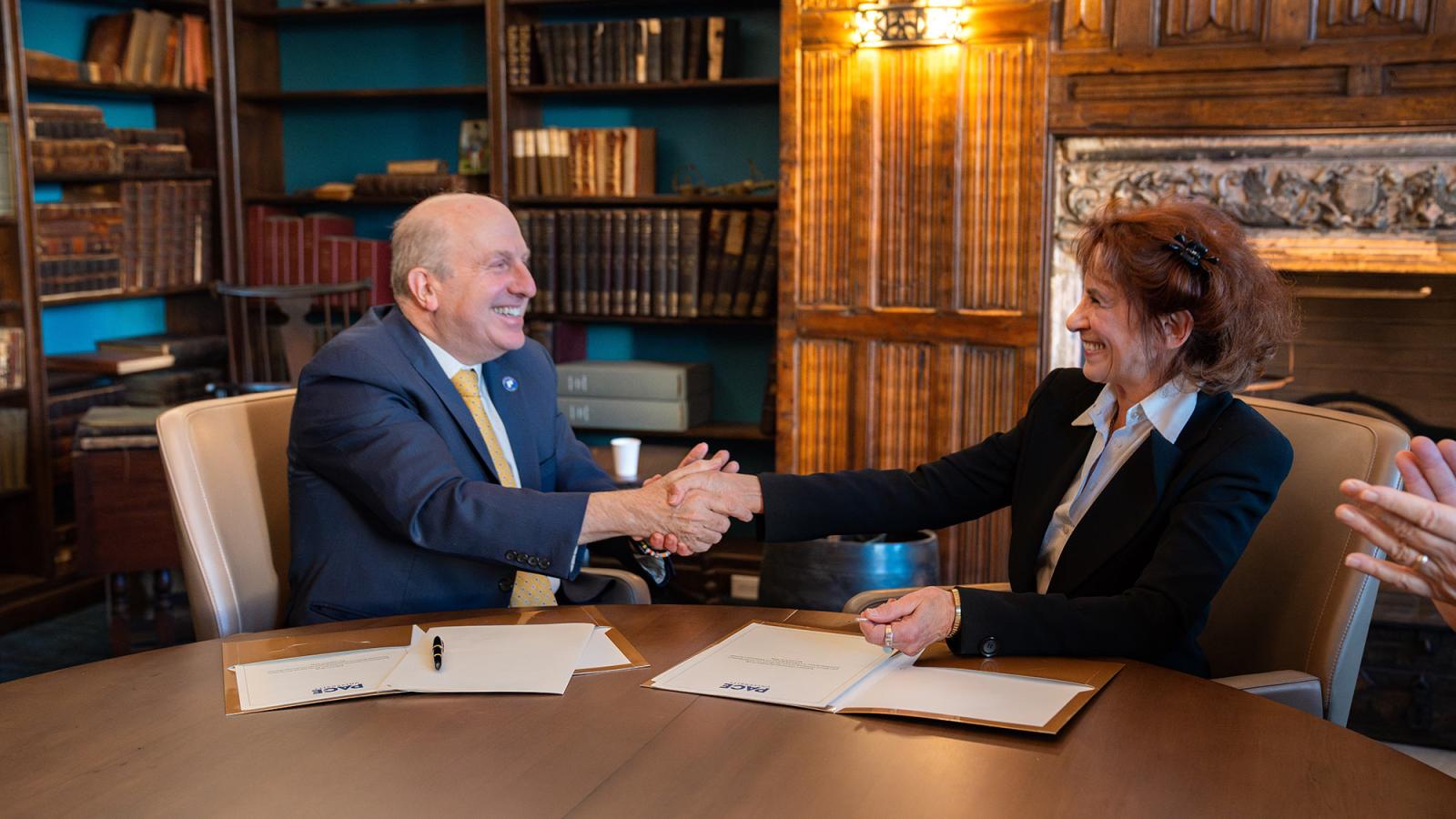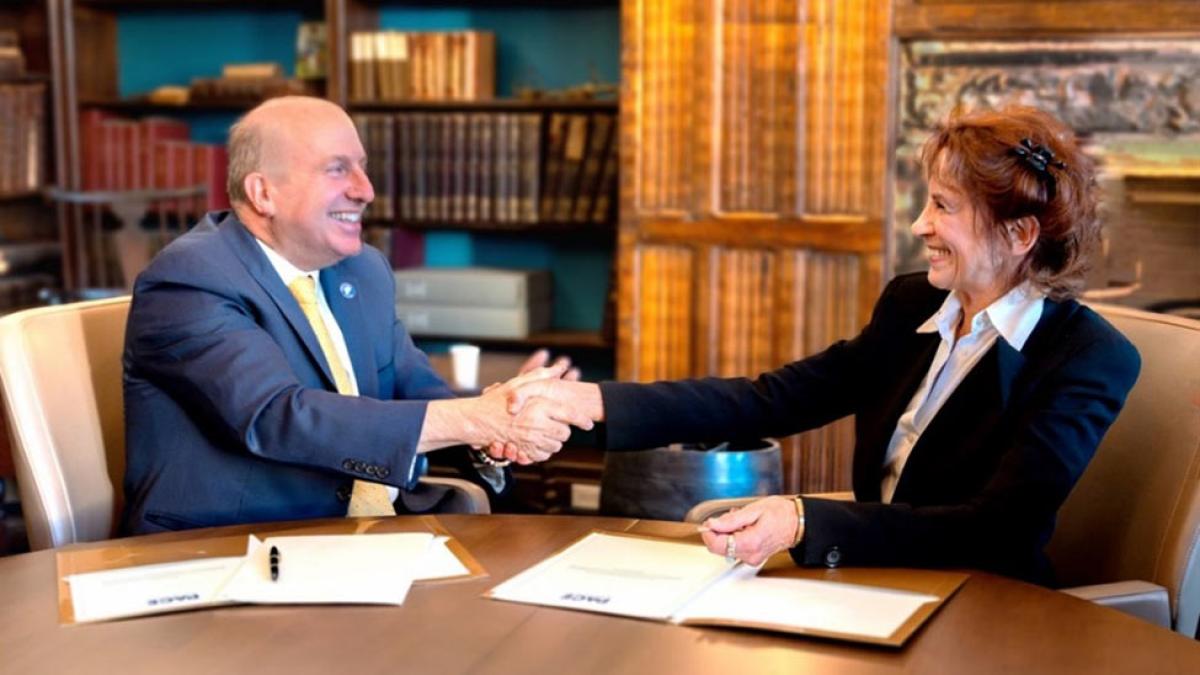Cincinnati Native Makes It To Broadway, Joins Cast For 2025 Musical
Sands College student Ndaya Dream Hawkins is joining the original Broadway cast of "Smash," a musical inspired by the hit 2012 TV series of the same name that chronicles the making of a musical about Marilyn Monroe – and The Cincinnati Inquirer has the story.
Press Release: Pace University Launches the Gale Epstein Center for Technology, Policy and the Environment
Pace University is pleased to announce the establishment of the Gale Epstein Center for Technology, Policy, and the Environment, made possible by a significant gift from Gale Epstein, a New York City-based philanthropist and business leader. The new center is housed in the Seidenberg School of Computer Science and Information Systems.


Gift establishes new center advancing the environmental right-to-know.
Pace University is pleased to announce the establishment of the Gale Epstein Center for Technology, Policy, and the Environment, made possible by a significant gift from Gale Epstein, a New York City-based philanthropist and business leader. The new center is housed in the Seidenberg School of Computer Science and Information Systems.
The Gale Epstein Center is dedicated to advancing technologies and policies that ensure the public’s right to know the environmental conditions that can threaten their communities. Its primary focus includes creating real-time sensing, information and warning systems, as well as advocating for public policy reforms to implement these technologies effectively. A key priority is the development of a nationwide alert system to warn consumers of drinking water dangers before consumption— an initiative that will save millions of people from preventable illnesses, according to the center’s incoming executive director John Cronin. The gift establishes the center’s future for decades to come.
“Sustainability will only be achieved if the communities can make informed decisions about their health and environment based on readily available information generated in real-time,” said Pace President Marvin Krislov. “This requires substantial investments in technology and policy innovation. We are deeply grateful to Ms. Epstein for empowering Pace to carry out this mission.”
The center was officially launched during a signing ceremony honoring Epstein’s generous gift and enduring commitment to environmental advocacy. “I chose Pace University because we share a commitment to the development of new tools and new ideas for protection of the human and natural environment,” said Epstein. “In a time of unprecedented threats, from climate change to microplastics, we must train a new generation of enlightened professionals who can arm the public with the information vital to their well-being and essential to meaningful change.”
Jonathan Hill, DPS, interim provost of Pace University, underscored the center’s academic importance. “The Gale Epstein Center will provide our students and faculty with the tools and resources to develop real-world solutions to critical environmental challenges,” Hill said. “This is a proud moment for Pace as we expand our commitment to sustainability and innovation.”
Li-Chiou Chen, PhD, interim dean of the Seidenberg School of Computer Science and Information Systems, highlighted how the center aligns with the university’s mission of fostering innovation. “This transformative gift will allow the Seidenberg School to lead in developing innovative solutions at the intersection of technology, policy, and the environment,” Chen said. “The Gale Epstein Center embodies the school’s commitment to advancing technologies that empower communities and protect the environment, ensuring a more sustainable future for all.”
The center builds on Pace’s legacy of environmental leadership, exemplified by John Cronin, founder of the Seidenberg School’s Blue CoLab, former Hudson Riverkeeper, and a Time Magazine Hero for the Planet. Cronin, who also co-founded the Elisabeth Haub School of Law’s Environmental Litigation Clinic in 1986, underscored the global importance of the center’s mission.
“It is a central principle of international human rights that people have a right to information that affects their lives, such as the quality of drinking water or personal threats posed by climate change,” said Cronin. “The Gale Epstein Center with its extensive teaching, training and research facilities, is well-equipped to accomplish its mission of environmental right-to-know.”
Gale Epstein’s philanthropic legacy spans decades of support for environmental, animal rights, social, and arts organizations. As co-founder, creative director and president of Hanky Panky, a global leader in intimate apparel, she has championed sustainability from production to packaging, relying exclusively on U.S.-made fabrics and manufacturing. Epstein has also been the principal supporter of the Seidenberg School’s Blue CoLab since its inception in 2020.
About Pace University
Since 1906, Pace University has been transforming the lives of its diverse students—academically, professionally, and socioeconomically. With campuses in New York City and Westchester County, Pace offers bachelor, master, and doctoral degree programs to 13,600 students in its College of Health Professions, Dyson College of Arts and Sciences, Elisabeth Haub School of Law, Lubin School of Business, Sands College of Performing Arts, School of Education, and Seidenberg School of Computer Science and Information Systems.
About the Seidenberg School of Computer Science and Information Systems
The Seidenberg School of Computer Science and Information Systems at Pace University is a leading institute of technology education. Students experience a dynamic and expansive technology education at the undergraduate and graduate levels. One of the first comprehensive schools of computing in the nation, the Seidenberg School is strategically located in the heart of NYC’s tech scene, right on the doorstep of New York’s most promising companies. With access to established tech giants and exciting new start-ups from both the New York City and the Westchester campus, Seidenberg offers the opportunity to connect, intern with, and enjoy lucrative tech jobs following graduation. Through partnerships with leading tech firms, banks, federal agencies, and global institutions, the school’s curricula and programs are designed to ground students in the fundamentals while offering numerous hands-on experiential learning opportunity. The faculty includes numerous experts in artificial intelligence, cybersecurity, data science, game development, software engineering, and much more, who operate labs and centers providing students with practical experience and connections that lead to impressive internships and jobs.